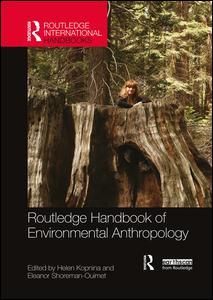Routledge Handbook of Environmental Anthropology Routledge Environment and Sustainability Handbooks Series

Environmental Anthropology studies historic and present human-environment interactions. This volume illustrates the ways in which today's environmental anthropologists are constructing new paradigms for understanding the multiplicity of players, pressures, and ecologies in every environment, and the value of cultural knowledge of landscapes.
This Handbook provides a comprehensive survey of contemporary topics in environmental anthropology and thorough discussions on the current state and prospective future of the field in seven key sections. As the contributions to this Handbook demonstrate, the subfield of environmental anthropology is responding to cultural adaptations and responses to environmental changes in multiple and complex ways. As a discipline concerned primarily with human-environment interaction, environmental anthropologists recognize that we are now working within a pressure cooker of rapid environmental damage that is forcing behavioural and often cultural changes around the world. As we see in the breadth of topics presented in this volume, these environmental challenges have inspired renewed foci on traditional topics such as food procurement, ethnobiology, and spiritual ecology; and a broad new range of subjects, such as resilience, nonhuman rights, architectural anthropology, industrialism, and education. This volume enables scholars and students quick access to both established and trending environmental anthropological explorations into theory, methodology and practice.
Part 1: The Development of Environmental Anthropology 1. Introduction 2. History and Scope of Environmental Anthropology 3. Ethnobiology and the New Environmental Anthropology 4. Anthropology and the Environment: Beginnings 5. Ethnoscientific implications of classification as a socio-cultural processPart 2: Investigations in sub-fields of environmental anthropology 6. Enviromateriality: Exploring the Links between Political Ecology and Material Culture Studies 7. Historical Ecology: Agency in Human-Environment Interaction8. Architectural Anthropology: Developing methodological framework for Indigenous wellbeing 9. Beyond "nature": Towards more engaged and care-full ways of relating to the environment Part 3: Ecological Knowledge, Belief and Sustainability 10. An Anthropology of Nature – or an Industrialist Anthropology? 11. Spiritual Ecology, Sacred Places, and Biodiversity Conservation 12. The Bible, Religion, and the Environment 13. What’s ontology got to do with it? On the knowledge of nature and the nature of knowledge in environmental anthropology 14. Unsustainability in action: An ethnographic examination15. Anthropological Approaches to Energy Part 4: Climate Change, Resilience and Vulnerability 16. Disasters and Their Impact: A Fundamental Feature of Environment 17. The Concepts of Adaptation, Vulnerability and Resilience in the Anthropology of Climate Change 18. Climate, Environment and Society in Northwest Greenland19. Taking Responsibility for Climate Change: On Human Adaptation, Sustainable Consumption and Environmental Governance 20. Climate change adaptation and development planning: from resilience to transformation? Part 5: Justice, ethics, and governance 21. Justice for All: inconvenient truths and reconciliation in human-non-human relations22. Environmental Ethics and Environmental Anthropology 23. Battle of the Ecologies–Deep vs. Political: An Investigation of Anthropocentrism in the Social Sciences24. ‘Good governance’, corruption, and forest protection: critical insights from environmental anthropology 25. Cultural ecotourism as an indigenous modernity: Namibian Bushmen and two contradictions of capitalismPart 6: Health, Population, and Environment 26. Local and organic food movements 27. Anthropocentrism and the making of Environmental Health 28. Multi-Species Entanglements, Anthropology and Environmental Health Justice 29. Challenging the Conventional Wisdom: Breast Cancer and Environmental Health 30. Excessive Human Numbers in a World of Finite Limits: Confronting the Threshold of Collapse Part 7: Environment and Education 31. Children’s language about the environment 32. "You have to do it": Creating Agency for Environmental Sustainability through Experiential Education33. Cognition and cultural modeling 34. Perceiving Nature’s Personhood: Anthropological Enhancements to Environmental Education35. Schooling the World: Land-based pedagogies and the culture of schooling
Helen Kopnina is assistant professor of environmental anthropology at the Institute of Cultural Anthropology and Development Sociology at Leiden University, the Netherlands. She is also a coordinator and lecturer within the Sustainable Business Program and researcher in the fields of environmental education and environmental social sciences at The Hague University of Applied Sciences, the Netherlands.
Eleanor Shoreman-Ouimet is an environmental anthropologist and currently teaches in the Anthropology Department at the University of Connecticut, USA. Her research focuses on human–environment interactions, cross-cultural conservation practices, community response to natural hazards, and the effects of climate change.
Date de parution : 01-2019
17.4x24.6 cm
Date de parution : 08-2016
17.4x24.6 cm
Mots-clés :
Llanos De Mojos; Environmental Anthropology; ANT; Energy Sources; Biodiversity; Environmental Health Justice; Climate Change; Environmental Education Theory; Conservation; Human Environment Interaction; Environmental economics; Human Environment Relationship; Environmental policy; Political Ecology; Environmental studies; Alf Hornborg; Melissa Leach; Michael Dove; Architectural Anthropology; Sustainability; Spiritual Ecology; Sustainable development; Ecological Anthropology; TEK; Mainstream Food System; community; Non-human Animals; culture; Historical Ecology; elite; Human Environmental Relations; emic; Natural World; environmental racism; Common Pool Resources; ethnography; Redd; etic; Cultural Ecotourism; health; CCD; indigenous; Wind Break Walls; knowledge; Good Governance Agenda; participation; Northwest Greenland; power; traditions; Eleanor Shoreman-Ouimet; Eduardo Brondízio; Ryan T; Adams; Stefano Fiorini; E; N; Anderson; Alan R; Beals; David G; Casagrande; José E; Martínez-Reyes; Lauren Dodaro; Dustin Reuther; Angela Kreutz; Paul Memmott; Mark Coeckelbergh; David W; Kidner; Leslie E; Sponsel; Ronald A; Simkins; Sian Sullivan; Sayd Randle; Lauren Baker; C; Anne Claus; Chris Hebdon; Alder Keleman; Michael R; Dove; Peter Wynn Kirby; Susanna M; Hoffman; Anthony Oliver-Smith; Mark Nuttall; Cindy Isenhour; Bob Pokrant; Veronica Strang; Holmes Rolston; Bernard Daley Zaleha; Pauline von Hellermann; Stasja Koot; Merrill Singer; Melanie Rock; Mary K; Anglin



